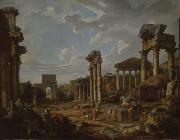Wholesale Oil Painting No Minimum |
|||||||||||
|
|
|||||||||||

|
|||||||||||
|
|
|
||||||||
Giovanni Paolo Panini17 June 1691 - 21 October 1765) was an Italian painter and architect, mainly known as one of the vedutisti . As a young man, Panini trained in his native town of Piacenza, under Giuseppe Natali and Andrea Galluzzi, and later the stage designer Francesco Galli-Bibiena. In 1711, he moved to Rome, where he studied drawing with Benedetto Luti and became famous as a decorator of palaces, including the Villa Patrizi (1719-1725), the Palazzo de Carolis (1720), and the Seminario Romano (1721-1722). In 1719, Panini was admitted to the Congregazione dei Virtuosi al Pantheon. He taught in Rome at the Accademia di San Luca and the Academie de France, where he influenced Jean-Honore Fragonard. In 1754, he served as the principal of the Accademia di San Luca. Panini died in Rome on 21 October 1765 As a painter, Panini is best known for his vistas of Rome, in which he took a particular interest in the city's antiquities. Among his most famous works are the interior of the Pantheon, and his vedute paintings of picture galleries containing views of Rome. Most of his works, specially those of ruins have a substantial fanciful and unreal embellishment characteristic of capriccio themes. |
||||||||
|
|
||||||||
A Capriccio of the Roman Forum
A Capriccio of the Roman Forum Painting ID:: 72956 |
"A Capriccio of the Roman Forum," oil on canvas, by the Italian painter and architect Giovanni Paolo Panini. 67 1/4 in. x 85 3/4in. Yale University Art Gallery, Stephen Carlton Clark, B.A.1903, Fund. Courtesy of Yale University, New Haven, Conn.
1741(1741)
cjr "A Capriccio of the Roman Forum," oil on canvas, by the Italian painter and architect Giovanni Paolo Panini. 67 1/4 in. x 85 3/4in. Yale University Art Gallery, Stephen Carlton Clark, B.A.1903, Fund. Courtesy of Yale University, New Haven, Conn. 1741(1741) cjr |
|||||||
|
|
||||||||
|
Giovanni Paolo Panini 17 June 1691 - 21 October 1765) was an Italian painter and architect, mainly known as one of the vedutisti . As a young man, Panini trained in his native town of Piacenza, under Giuseppe Natali and Andrea Galluzzi, and later the stage designer Francesco Galli-Bibiena. In 1711, he moved to Rome, where he studied drawing with Benedetto Luti and became famous as a decorator of palaces, including the Villa Patrizi (1719-1725), the Palazzo de Carolis (1720), and the Seminario Romano (1721-1722). In 1719, Panini was admitted to the Congregazione dei Virtuosi al Pantheon. He taught in Rome at the Accademia di San Luca and the Academie de France, where he influenced Jean-Honore Fragonard. In 1754, he served as the principal of the Accademia di San Luca. Panini died in Rome on 21 October 1765 As a painter, Panini is best known for his vistas of Rome, in which he took a particular interest in the city's antiquities. Among his most famous works are the interior of the Pantheon, and his vedute paintings of picture galleries containing views of Rome. Most of his works, specially those of ruins have a substantial fanciful and unreal embellishment characteristic of capriccio themes. A Capriccio of the Roman Forum English: "A Capriccio of the Roman Forum," oil on canvas, by the Italian painter and architect Giovanni Paolo Panini. 67 1/4 in. x 85 3/4in. Yale University Art Gallery, Stephen Carlton Clark, B.A.1903, Fund. Courtesy of Yale University, New Haven, Conn. Date 1741 cyf |
||||||||
|
|
||||||||
|
Prev Next
|
||||||||
|
|
||||||||
|
Related Paintings to Giovanni Paolo Panini :. |
||||||||
|
|
||||||||
|
CONTACT US |

